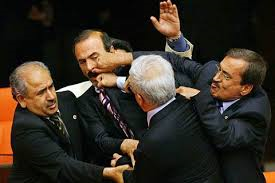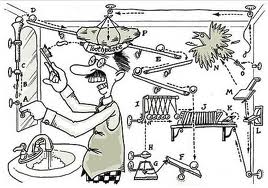The recent Chinese cash crunch was a sign from the government of its intention to reign in credit growth to the shadow banking system, wasteful local governments and speculators. Part of the problem is that Chinese banks can’t offer competitive interest rates to savers. As such, savers seek riskier, speculative investments. Something else the government might do- offer bank deposit insurance as a way to keep more deposits in banks.
Tag Archives: eisenberg and economist
Less is Less
One reason the economy has been growing slowly is due to large productivity increases. GDP is 3% higher than before the bust, yet employment is down by 1.6%. Similarly, industrial production is 2% shy of its all-time high, yet capacity utilization is 4% below what it was on 12/07. As a result, spending on plant and equipment has been substantially delayed along with the concomitant rise in hiring.
Pump it Up
Despite a US Energy Information Administration report that global oil reserves are 10% higher than in 2011, due to the discovery of 345 billion barrels of shale oil, don’t expect lower pump prices. This is because unlike Alaskan oil, shale oil comes from hundreds of small wells, with high production costs. If prices fall, pumping will cease. Thus, shale oil will only act to cap or dampen price rises.
Bearable Budget Battle
The budget deficit is falling rapidly and is now projected to be $642 billion, or 4% of GDP, in FY 2013. It was projected to be $200 billion higher just three months ago. This improvement will delay the next debt ceiling brawl from June to November. And with election season already starting by then, expect substantially reduced political rancor. Despite the improvement, revenues will cover just 81% of federal outlays.
Tax Unreform
Between Benghazi, the heavy-handed AP data grab and the IRS fiasco, any tiny window for tax reform has all but shut. While Senator Baucus and Representative Camp, who head up both tax writing committees have 17 months until the next election, the combination of an uninvolved administration, 2014 being an election year, fierce lobbying against change by corporations, and a requirement for budget neutrality make any chance for reform history.
Pool Anyone?
The Friday File: In August, houses with pools sell for about 0.2% more than homes without pools while in May, June and July pools add just 0.1%, half as much. Conversely, from November through March, swimming pools reduce house prices by about 0.15% while in April, September and October pools have no impact. Even at their peak in August, pools don’t raise house prices by the cost of the pool.
Poor Peso
Running low on foreign reserves, Argentina is making it increasingly difficult for Argentines to purchase US dollars, which has widened the gap between the official exchange-rate and the black-market rate. And that has caused Argentines to make offshore purchases with credit-cards at the cheaper official rate. In response, the government has raised taxes on offshore credit-card purchases which have led to further declines in the black-market rate. Devaluation is inevitable.






